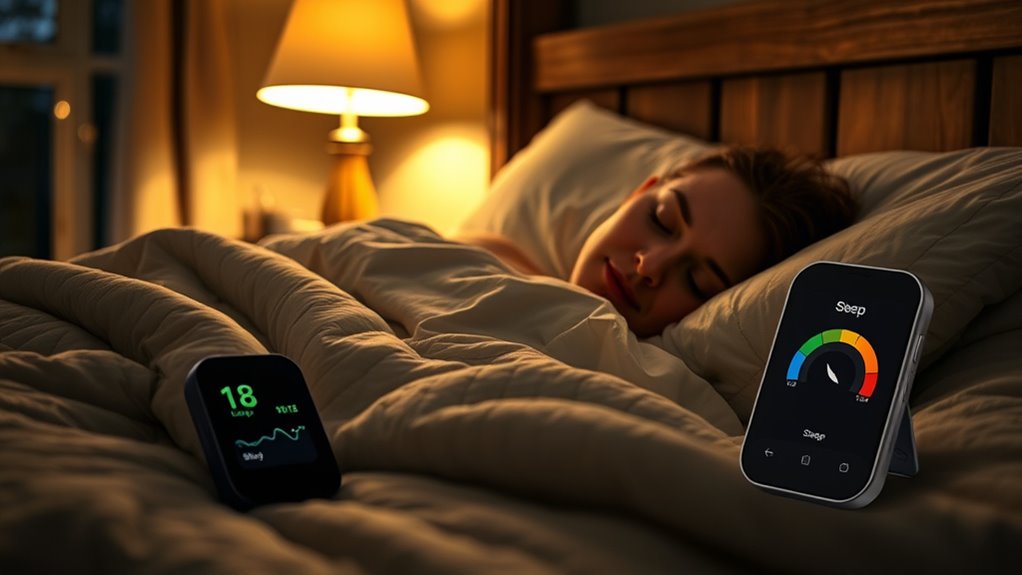Understanding your sleep stages—light, deep, and REM—helps you optimize your rest at home for better health. As you cycle through these stages each night, your body unwinds, restores, and maintains mental clarity. Knowing how each phase works supports better sleep habits and environment choices. If you want to learn how to enhance your sleep quality and create a perfect sleep routine, keep exploring this guide for helpful insights.
Key Takeaways
- Sleep cycles last about 90 minutes, alternating between light, deep, and REM sleep, each serving distinct restorative functions.
- Proper sleep environment—cool, dark, quiet—facilitates smoother transitions through sleep stages.
- Deep sleep supports physical repair and memory consolidation, while REM sleep enhances emotional and cognitive processing.
- Circadian rhythm regulates sleep-wake patterns; disruption can impair sleep quality and overall health.
- Consistent routines and early detection of sleep issues ensure better sleep health and long-term wellness.
The Basics: Understanding the Sleep Cycle

Have you ever wondered what happens when you sleep? Your body follows a natural cycle called the sleep cycle, which repeats throughout the night. This cycle is regulated by your circadian rhythm, the internal clock that signals when to sleep and wake. When you’re sleep-deprived, your circadian rhythm can get out of sync, making it harder to fall asleep or stay asleep. This disruption impacts your overall health and mood. The sleep cycle includes different stages, from light sleep to deep sleep, each serving a unique purpose. Understanding this cycle helps you see why consistent sleep patterns matter. When you respect your circadian rhythm, you improve sleep quality and reduce the effects of sleep deprivation, supporting better physical and mental well-being.
The Light Sleep Stage: Your Body Starts to Unwind

As you enter the light sleep stage, your body begins to relax and wind down from wakefulness. This phase signals the shift into deeper sleep, helping your muscles loosen and your breathing slow. It’s a vital moment when your body starts to unwind and prepare for restorative rest.
Transition Into Deep Sleep
Once you exit the initial stages of sleep, your body begins to unwind more deeply during the light sleep stage. This shift is influenced by your bedtime routines and sleep environment. Establishing consistent routines signals to your body that it’s time to relax, helping you move smoothly into deeper sleep. A comfortable sleep environment—dark, cool, and quiet—supports this change by minimizing disruptions. As your body relaxes further, heart rate and breathing slow down, preparing you for the next stage of restorative sleep. During this phase, your muscles loosen, and your brain activity begins to shift toward the patterns seen in deep sleep. Focusing on a calming bedtime routine and maintaining an ideal sleep environment can facilitate a seamless transition into deep sleep.
Body Begins Relaxing
During the light sleep stage, your body begins to relax more deeply, signaling a shift from wakefulness. You might notice your breathing slowing, muscles loosening, and your mind drifting toward dreaming patterns. Your sleep environment plays a vital role here—dim lighting, a comfortable mattress, and a cool room help ease this transition. As you enter this stage, your body unwinds, preparing for deeper sleep phases. The quality of your sleep environment influences how smoothly you progress into and out of this relaxation phase. Here’s a quick look at what happens during this stage:
| Aspect | What Happens | Tips for Better Sleep |
|---|---|---|
| Breathing | Slows and becomes more regular | Keep a cool, dark room |
| Muscle Tone | Loosens, reducing tension | Use comfortable bedding |
| Dreaming Patterns | Begin to form, often brief and fragmented | Limit screen time before bed |
Deep Sleep: The Restorative Powerhouse

Deep sleep, often considered the most restorative stage of the sleep cycle, plays a vital role in your overall health. During this phase, your body repairs tissues, boosts immune function, and consolidates memories. Deep sleep importance extends beyond physical recovery; it also enhances your mental clarity and emotional resilience. You may notice that dream benefits are less prominent here, but this stage sets the foundation for vivid, meaningful dreams during REM sleep later. If you don’t get enough deep sleep, you might feel groggy, irritable, or unmotivated. Prioritizing this stage helps guarantee your body can fully recharge, supporting long-term wellness, cognitive function, and emotional balance. Deep sleep is your body’s powerhouse for restoration and rejuvenation.
REM Sleep: Dreamland and Brain Boosts

After a period of deep sleep, your brain enters a vibrant phase known as REM sleep, where most vivid dreaming occurs. During this stage, brain activity ramps up markedly, almost matching wakefulness levels. This heightened activity helps with memory consolidation and emotional processing. If you wake up during REM, you’re more likely to recall your dreams, enhancing dream recall. REM sleep also plays an indispensable role in boosting brain functions like problem-solving and creativity. As your eyes dart beneath closed lids, your brain is actively weaving intricate narratives, even if you don’t remember them. This stage is vital for mental refreshment, and the more uninterrupted REM you get, the better your brain performs during the day.
How Sleep Stages Shift Throughout the Night

As you sleep, your sleep stages go through a cycle that repeats several times each night. These cycles shift in duration, with some stages lasting longer at different times. Understanding how your sleep stages change can help you better grasp the importance of a full night’s rest.
Sleep Cycle Progression
Throughout the night, your sleep stages follow a predictable pattern, cycling through different phases as you rest. Typically, your sleep cycle lasts about 90 minutes, repeating multiple times. In the first cycle, you’ll spend more time in deep NREM sleep, which helps with physical restoration. As the night progresses, REM sleep episodes lengthen, making dream recall more vivid and frequent. These cycles shift gradually, with lighter sleep stages giving way to deeper sleep and REM phases. This progression guarantees your body and mind get the rest they need. Understanding this pattern helps you realize that each cycle plays a crucial role in your overall sleep quality, balancing restorative processes and dream activity throughout the night.
Variations in Duration
Sleep stages don’t stay the same throughout the night; their durations vary considerably from one cycle to the next. Early in the night, you’ll spend more time in deep NREM sleep, with longer sleep durations dedicated to restorative processes. As morning approaches, REM sleep periods lengthen, often becoming longer and more frequent. This sleep variability is normal and essential for your overall rest quality. Your sleep cycle shifts between lighter and deeper stages, influencing how long you stay in each one throughout the night. These fluctuations help your brain and body recover and prepare for the day ahead. Understanding this variation can improve your awareness of sleep health, highlighting that not every night will look exactly the same in terms of sleep duration or stage distribution.
Why Quality Sleep Matters for Your Wellness

Getting enough quality sleep is essential because it directly impacts your physical health, mental clarity, and overall well-being. When you prioritize good sleep hygiene, you set the foundation for restorative sleep cycles. Quality sleep enhances your ability to process dreams, aiding in emotional regulation and subconscious understanding. Poor sleep leaves you vulnerable to health issues and hampers mental performance. By maintaining consistent routines, you promote deeper, more effective sleep stages. Consider how sleep influences your daily resilience and long-term health. Here’s a quick overview:
| Aspect | Impact | Tips |
|---|---|---|
| Physical Health | Restores immune function | Regular sleep schedule |
| Mental Clarity | Improves focus and memory | Limit screens before bed |
| Emotional Well-being | Reduces stress, enhances mood | Practice relaxation techniques |
| Dream Analysis | Deepens self-awareness | Keep a dream journal |
Tips to Improve Your Sleep Environment and Routine

Creating an ideal sleep environment and establishing a consistent routine can considerably boost the quality of your rest. Start by optimizing your sleep environment: keep your bedroom cool, dark, and quiet to promote deeper sleep. Use blackout curtains or a sleep mask to block out light, and consider earplugs if noise is an issue. Invest in a comfortable mattress and pillows suited to your preferences. Next, develop a calming bedtime routine that signals your body it’s time to wind down. Avoid screens at least an hour before bed, and try relaxing activities like reading or gentle stretching. Going to bed and waking up at the same time every day helps regulate your internal clock. These simple adjustments can make a significant difference in the quality of your sleep.
Recognizing Sleep Disruptions and When to Seek Help

While occasional disruptions are normal, persistent sleep problems can seriously affect your health and daily life. If you notice frequent difficulty falling asleep, staying asleep, or feeling exhausted despite enough rest, you may have a sleep disorder. Signs such as loud snoring, choking during sleep, or acting out dreams could indicate conditions like sleep apnea. Excessive daytime fatigue, irritability, or concentration issues also signal a problem. Don’t rely solely on sleep medication to manage these issues; consulting a healthcare professional is essential for proper diagnosis and treatment. Recognizing these symptoms early helps you seek appropriate help and avoid long-term health risks. If sleep disturbances persist, see a specialist to determine the root cause and explore effective treatment options.
Frequently Asked Questions
How Do Sleep Stages Affect Overall Mental Health?
Your sleep stages directly impact your mental health by influencing your mood, memory, and stress levels. Proper sleep cycle regulation helps you experience restorative REM sleep, where dream analysis occurs, boosting emotional resilience. When your sleep stages are disrupted, it can lead to anxiety, depression, and cognitive issues. Prioritizing good sleep habits guarantees your brain gets the necessary downtime, supporting overall mental well-being and clearer thinking.
Can Sleep Stages Be Accurately Tracked at Home?
You can definitely track sleep stages at home using sleep tracking devices. Think of these devices as your personal sleep detectives, gathering data while you rest. Many home devices now offer insights into REM, deep, and light sleep, making it easier to understand your patterns. While not as precise as lab equipment, these tools give you a good overview and help improve your sleep habits.
What Are the Long-Term Consequences of Disrupted Sleep Cycles?
Long-term sleep cycle disruptions can lead to serious health issues. You might experience sleep deprivation, which weakens your immune system, impairs memory, and increases risk for chronic conditions like heart disease and diabetes. Circadian disruption messes with your body’s natural rhythms, causing fatigue, mood swings, and reduced alertness. Over time, these problems can markedly lower your quality of life, making it essential to prioritize consistent, restorative sleep.
How Do Lifestyle Choices Influence Sleep Stage Progression?
A stitch in time saves nine, and your lifestyle choices greatly influence your sleep stage progression. By practicing good sleep hygiene and establishing consistent bedtime routines, you help your body smoothly shift through sleep stages. Avoid caffeine, screen time, and irregular sleep schedules. These habits promote restorative sleep, improve overall health, and guarantee you wake up refreshed. Consistency and mindful choices are your best allies in achieving quality sleep every night.
Are There Specific Foods That Promote Healthy Sleep Stages?
Yes, certain sleep-inducing foods can help promote healthy sleep stages. You should consider bedtime snacks like bananas, almonds, or warm milk, which contain magnesium or tryptophan to boost relaxation. Incorporate sleep-inducing foods such as cherries or oats into your evening routine. These foods can enhance your body’s melatonin production and support deeper, restorative sleep stages, helping you wake up feeling more refreshed and energized.
Conclusion
Understanding your sleep stages helps you take control of your rest. Remember, a good night’s sleep is the foundation of wellness—it’s true what they say, “You are what you sleep.” By creating a cozy sleep environment and sticking to a routine, you set yourself up for restorative nights. Don’t ignore persistent disruptions; seeking help is a sign of strength. Prioritize your sleep, and watch your health and happiness thrive.









